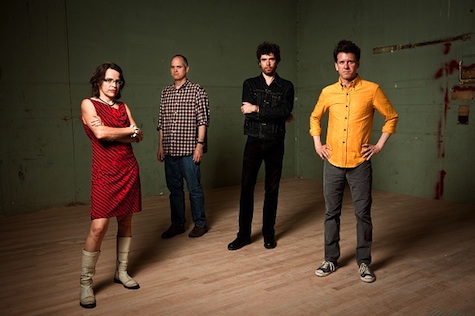
Forever Shredding
Superchunk’s legend is more than their longevity.
by Tim McMahan, Lazy-i.com
To put the importance of Superchunk into some sort of context, let’s turn to Ira Robbins, who in his Trouser Press Guide to ’90s Rock
, said:
“Although Superchunk has never been revolutionary, the North Carolina quartet has done more to foment the indie-pop revolution than nearly any other band extant, feeding its flames with a steady stream of releases, an incessant appetite for touring and a voracious fandom that’s seen it underwrite numerous kindred spirits on its own Merge label. Like missionaries bringing the word to the outback, Superchunk ushered in an era in which ethics and avowed self-determination were just as important as artistic productivity — a stance that’s probably influenced far more culturalists than the band’s sound.”
They also made some pretty damn fine records.
Anyone who grew up loving college rock in the ’90s has a Superchunk album in his/her collection. My first was 1993’s On the Mouth, whose opening track, “Precision Auto,” with its chugging guitar, crash-bash rhythms and barked out lines: “Do not pass me just to slow down / I can move right through you,” fueled way too many reckless two-lane passes in my ’78 Ford Fiesta.
Superchunk arguably put the Chapel Hill music scene on the map, producing eight full-lengths and countless singles since its debut 45, “Slack Motherfucker,” came out in 1990. The term “legendary” comes to mind.
Superchunk guitarist Jim Wilbur, however, will have none of it.
“We’re not the beginning of anything,” said the self-proclaimed Larry David of the band from the deck of his home in Durham, North Carolina. “There were always tons of bands around Chapel Hill at the same time, like Polvo and Archers of Loaf. No one was doing anything to be part of a scene. It just kind of worked out that way. It’s hard to figure out what was going on, but after the fact, people want to write and talk about it. But in the middle of it, it was organic. It was people in their early 20s doing what comes naturally.”
Wilbur said he moved from Connecticut to North Carolina 20 years ago to join Superchunk for three months, and never left. “There might be something to being in a place where you’re not New York, Los Angeles or Chicago. Clearly you’re not there to exploit an opportunity,” he said. “You’re doing it for your own reasons. For fun or laziness. I don’t think many people who are really good at music do it as a career. It just becomes one. You have better chances at making a living buying a lottery ticket.”
Despite that, Wilbur and the rest of Superchunk — frontman/guitarist Mac McCaughan, bass player Laura Ballance, and drummer Jon Wurster — were anything but lazy when it came to the band. “It’s work; it’s tough work to be in a band and tour,” Wilbur said. “You can’t stop and think about who’s paying attention to you. As long as they’re paying you to go on the road and put out records, people must be paying attention.”
The band’s work ethic defined Superchunk as much as their music. Although their records have been released on a few labels including indie powerhouse Matador Records, its McCaughan and Ballance’s own Merge Records that is their home. Along with bands like Fugazi, Superchunk was a standard bearer of the Do It Yourself approach to music, turning its back on major labels in a move that was a decade ahead of its time.
Asked if DIY is more important now, in an era when record labels are slowly decaying into obsolescence, Wilbur replied, “What do think?”
“It’s proven itself as a business method, maybe not for people who want to be Michael Jackson or Madonna, but if you want a career in rock and want to tour, you better get your shit together and know what you’re doing by yourself, because no one is helping you without taking a big cut,” he said. “We just wanted to be sustainable, and we were smart enough to know that we were going to have to do a lot of it ourselves. We all eat if we do our jobs. But in the ’90s, after Nirvana, there were so many bands getting into horrible deals where they were never going to be able to recoup the assloads of money that they would owe. This isn’t ideological. I don’t want to owe a multinational corporation lots of money. It never made sense, any offer we got. We knew we could always do better on our own.”
And they did, for years. But each year, Wilbur said, the band sold fewer and fewer CDs. After Here’s to Shutting Up was released on Merge in 2001, Superchunk began to slow down.
“We haven’t toured since 2001 really,” Wilbur said. “The last time was when that record came out. We did do one other thing after that with the Get-Up Kids that was demoralizing.”
Wilbur said the band agreed to do a tour opening for the then-popular Kansas City emo band. “None of us had any expectations, we never do,” he said. “They were nice guys and looked at us like, ‘You’re the reason we’re in a band,’ but it didn’t translate in a live setting. We were old farts playing loud, fast music. Their fans didn’t care about us. There were always girls in the front row on cell phones. That was not what we were about.”
But it wasn’t that tour that slowed them down, it was changes in their lives. “Over the years nothing’s really changed personality-wise with the band; everyone just has different priorities,” Wilbur said. “Mac had kids, Jon (Wurster) moved away. It was difficult to get together and make time.”
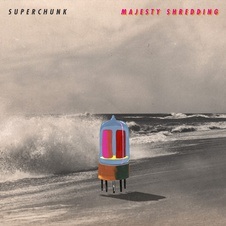
Superchunk, Majesty Shredding
Despite the distance, the band has never been dormant. They’ve continued to perform live at least once year, always writing new songs when they got together, Wilbur said. The product is Majesty Shredding, the band’s first album in nine years, slated for release Sept. 14 on Merge.
“It took us a year and a half to record,” Wilbur said. “We used to (make albums) in two weeks. It was easier when we were a full-time band and practiced three times a week. Now Mac sends out demos of songs, and we all have to figure out our parts and try to make it coalesce. In some ways, it sounds better. People seem to enjoy (the new record), and I like it, but I have no concept of it. I have no memory of playing or recording it.”
Wilbur said that moments before our interview July 7, he had picked up a guitar for the first time in three weeks, and — as always — had to figure out what he’d played during the recording sessions. “I can’t remember where my fingers were. What was I doing?” he said. “That’s always been the case. Even when we were in a band that worked all the time, we always forgot things. We don’t write anything down, except for Laura, but she plays bass and all she writes is ‘D minor.’ I don’t know what my fingering was, and Mac is even worse at it, but he’s a better player.”
Needless to say, Wilbur and the rest of Superchunk will have it all figured out before Saturday’s show. As the release date for Majesty Shredding creeps closer, the band is spending more time together, at least on the phone. “We now have business to attend to on a day-to-day basis, and it’s an incredible pain in the ass,” he said. “For the past 10 years we’ve been friends that didn’t have to talk to each other every day. Now we have to agree on everything. I try to stay out of it when I can. Mac and Laura run Merge, so I assume they know what they’re doing.
“I guess the reason we’re getting any kind of attention is that there’s a story about us, about the label and that we have a new record for the first time in years,” he said, adding that there’s nothing noteworthy about longevity.
“I’ve loved music my whole life. I loved The Byrds and Springsteen and New Order and they never went away. Even The Byrds stuck around past their prime. (Roger) McGuinn is still playing folk festivals somewhere. Springsteen is doing it, and it’s not newsworthy; it’s natural. I’ve always felt that way with this band — we’re just people playing this music, and as long as we enjoy doing it, we’re going to keep doing it.”
* * *
Talking to Jim Wilbur really is like talking to a rock ‘n’ roll version of Larry David. Here are a few extra bits of Wilbur Wisdom that I simply didn’t have room for in the story. Enjoy…
On touring: “I always think of it this way: I work in a book store selling things on ebay, and in the back room I work with this guy who likes to wear cowboy hats and snakeskin boots, and he’s always saying things like, ‘Rock and roll!’ and ‘You gonna pick up any pussy?’ I always say, ‘Barry, you just don’t get it. That’s not what this is all about.’ He’s joking around; he pays my health insurance, so I love him. People think this thing is glamorous. I tell them it’s work. It’s personalities and being sane and not having an inflated ego or an inflated sense of selves.”
So there are no crazy road stories to share?
“The stories all have to do with people we’ve hired to come with us to sell T-shirts. We’re the people bailing other people out of jail. The band was always trying to find time to sleep. You’re on tour to perform, not to do anything else. Everything else is peripheral. John the drummer started to say this recently about five hours before (showtime): ‘No one cares if I went out and had a good time before the show. They only care if we’re good. So I’m going to get my head together.’ He says it as if he’s a guru joker kind of guy. We’re not there to see who can do the most Jaeger shots.”
On technology: “What’s sad about progress is that recording studios are going under and engineers who have a specialized skill are being usurped by the fact that anyone can record at home with a computer and sound decent. But it’s not the same as going to the studio. I don’t think in 1982 anyone saw where the music industry would be in 2010.”
On side projects: “I don’t have any interests. I record stuff by myself sometimes and end up sometimes being part of Portastic (Mac’s side band) as a bass player. I’m the last person in the world that would want to pursue music. I do it purely for myself. I have no ambition whatsoever. I think it’s important to work. For a long time in Superchunk, I didn’t have a job and I sat around trying to figure out what to do all day when we weren’t on tour. It sucks to have two lives — two kind of realities — that you have to deal with, but you’ll be hard-pressed to get any sympathy.”
On returning to touring after nine years: “Now when I have to go on tour I kind of hate it. I miss not being home. I have a wife, two dogs, two cats, a beautiful house. I’m sitting on my deck now and am looking across my lawn. I have a huge yard with 30 pine trees. We have three bathrooms for the two of us. I live really nice, and now I have to go on tour? I like it because it’s good work. I see it as work.”
On being on the Jimmy Fallon show in the very near future: “I’ve never actually seen the show before. It’s always interesting, but it’s not like ‘I’ve never been kissed before.’ I have had sex, I’m not a virgin. I can do this. We’re all going to die. This isn’t going to go on forever. It takes a lot to get me excited. Being on the Jimmy Fallon show is not something that does that.”
On never playing in Omaha before: “We’ve never played in Nebraska or Omaha. It’s weird. We’ve talked about it many times. ‘What state haven’t we played? We’ve got a lot of friends in Omaha. How could this happen?’ Maybe our booking agent had an issue with someone or someone had an issue with him. It’s always about routing. Omaha is off the beaten path, the same way Iowa City is. We’re hugely excited about coming to Omaha. I’m looking forward to going. I want to see it, even though we’ll be there less than 24 hours.”
* * *
In case you missed it, the MAHA Music Festival is this Saturday. The schedule went online yesterday here at Lazy-i. Someone asked if you could come and go throughout the day. The answer, according to MAHA head honcho Tre Brashear, is yes, you can leave and return. I assume you’ll have to wear a wristband to get in and out (and to drink).
Tickets are $33 today, but the price jumps to $38 tomorrow. Either price is a bargain when you consider it costs $20-$30 just to see Spoon in other cities, and you’re also getting The Faint (usually $20-$25) and Superchunk (priceless), along with Kweller, Old 97’s and a plethora of local acts. If the forecast is accurate, it will be a gorgeous day for a concert. Look for tweet updates and photos throughout the day at twitter.com/tim_mcmahan
But that’s tomorrow. What’s going on tonight?
Over at the 1020 Lounge (formerly Trovato’s) Ted Stevens of Cursive (and Lullaby for the Working Class) will be doing two full solo sets (according to the promoter) tonight starting at 9. And there’s no cover (it’s free). This could get packed — this Stevens guy is pretty good.
Also tonight, Capgun Coup is headlining a show at the old Orifice Warehouse at 2406 Leavenworth (where Ratfest was held last year at around this time). Joining Capgun is New Jersey band Home Blitz, Omaha’s own Yuppies and the amazing Well-Aimed Arrows. This is a fun place to see a show. $5, 9 p.m.
And finally, indie rock band Dim Light plays at Stir Lounge tonight with headliner Scott Severin and the Milton Burlesque. $5, 9 p.m.
* * *
Read Tim McMahan’s blog daily at Lazy-i.com — an online music magazine that includes feature interviews, reviews and news. The focus is on the national indie music scene with a special emphasis on the best original bands in the Omaha area. Copyright © 2010 Tim McMahan. All rights reserved.

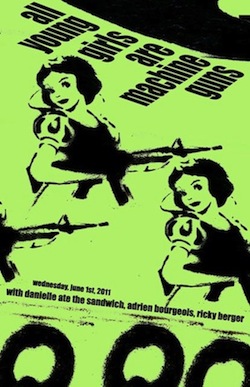


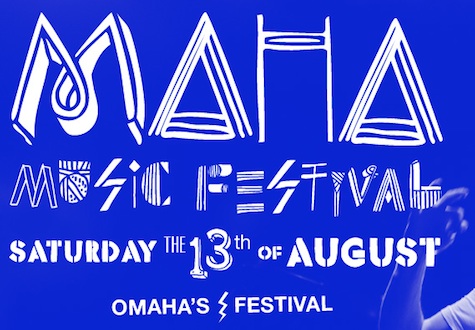

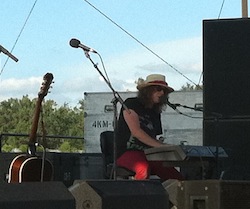

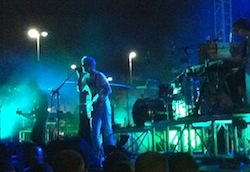
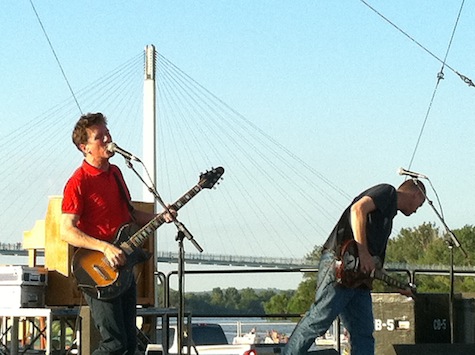


Recent Comments